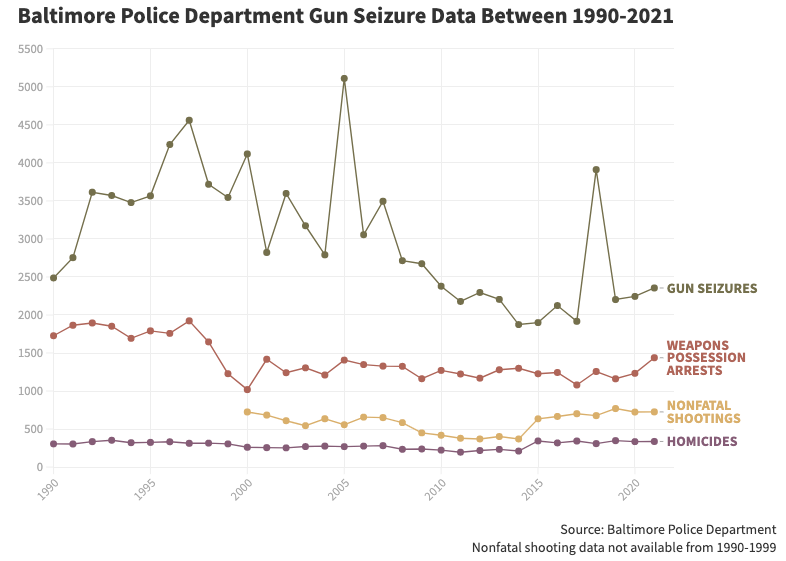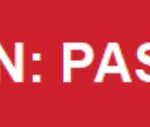
Former Baltimore Police Commissioner Frederick Bealefeld told me in 2018 that he began to realize that seizing guns was a bit like fighting the drug war. It felt “endless,” he explained.
“In Baltimore, at the peak of when we were seizing guns—when we were really effective going after guns and trying to get guns off the street—Baltimore PD would take in about 2,500 to 3,000 guns,” Bealefeld said. “Every year in the state of Maryland—every year—30,000 brand-new guns were being sold. We would seize 4,000 and high-five and claim victory and have photographs. But we can’t even keep up with the flow they sold that year.”
Bealefeld was commissioner from the middle of 2007 to about the middle of 2012, a period in which Baltimore City famously reduced arrests while also reducing homicides. In 2006, Baltimore Police made 90,283 arrests and the city endured 276 homicides. In 2011, Bealefeld’s last full year as commissioner, Baltimore Police arrested 60,009 people and there were 196 homicides, the lowest the city has seen since 1977 when there were 171 homicides.
Gun seizures and weapons possession arrests also dropped during this 2007-2012 “Bealefeld era.” In 2006, there were 3,055 seizures and 1,348 weapon possession arrests. In 2011, there were 2,178 seizures and 1,244 weapon possession arrests.
Manhattan District Attorney Alvin Bragg has also questioned the efficacy of focusing on gun possession. “We need to recognize that not every person charged with possessing an illegal gun in New York City is a driver of violence,” Bragg wrote on his campaign website. “My dad had an illegal gun not because he liked guns or because he was ‘dangerous’; he had a gun because of crime in the neighborhood. This was not an idle notion.” …
“There is no correlation (much less cause and effect) between guns seized and violent crime. A more relevant statistic is the clearance rate for serious crimes,” Maryland Shall Issue’s statement reads. “BPD’s arrest clearance rate for murder in 2020 was a merely 28.7% and only 44.9% in 2011. By comparison, the nationwide clearance rate for murder is 54.4%. Baltimore’s clearance rate for homicides is plainly abysmal, a reality that does not go unnoticed by violent criminals and law-abiding citizens alike.”
Data obtained by Battleground Baltimore shows that since 1990, the annual homicide clearance rate has significantly declined. In 1990, the clearance rate was 75.7%. In 2021, it was 42%. Arrests for murders have also plummeted. In 1990, there were 347 arrests for murder. In 2020, there were 102 (Baltimore Police did not provide Battleground Baltimore with 2021’s number). …
Additionally, the police’s inability to reduce violence no matter the number of guns seized puts people at risk, and that means they are more apt to obtain a gun for protection—“illegally,” if they must.
“Most [at-risk youth] possessed or used guns out of a generalized fear of being victimized or a specific fear of retaliation. A history of violence victimization also informed the decision to carry a firearm,” the National Institute For Justice wrote last year. “Many also reportedly felt a pervasive fear of the state, particularly law enforcement.”
Baltimore City Police Department Commissioner Michael Harrison has frequently focused on gun seizures. Following a series of shootings around Memorial Day 2021, Harrison spoke to local television affiliate Fox45 and said that crime in Baltimore is the way it is because there is “a lack of consequences for carrying guns.”
Harrison pretty much said the same thing in 2019 after a burst of troubling shootings around Memorial Day. Then, he promised that police would be “aggressive” about going after guns.
Recently, Mayor Brandon Scott bemoaned an especially deadly January, with 36 homicides and 49 nonfatal shootings, but stressed that police were working on it. There were 111 “gun arrests” in January, he boasted.
One of the reasons for seizing guns is not only to get them “off the street” but to use them as evidence and trace them to other crimes. But last week, when Baltimore City Police Commissioner Michael Harrison was asked how often guns that are seized are traced back to crimes, he said he did not know.
“I don’t have those statistics at my disposal at this moment,” Harrison said.
— Brandon Soderberg in 30 Years of Gun Seizures in Baltimore Haven’t Kept the City Safe




